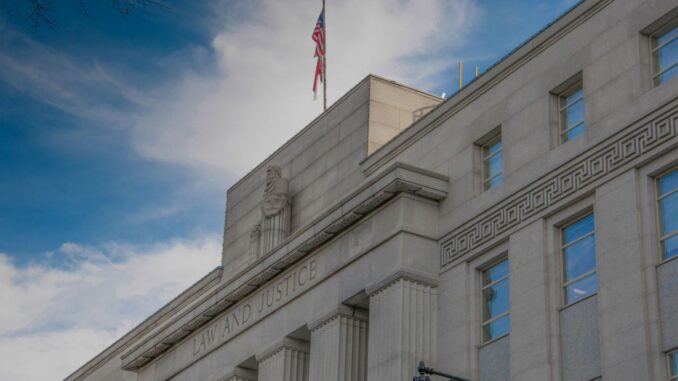
RALEIGH — The long-running Leandro education funding case is still far from a resolution after the N.C. Supreme Court granted a motion by the state controller and reinstated an order blocking the funding transfer.
The attorney for the state controller’s office, former state Supreme Court Justice Robert Hunter, filed a motion in February on behalf of current Controller Nels Roseland. Hunter had also represented the former controller, Linda Combs.
In a 5-2 decision, the Court granted the controller’s motion and reinstated a 2021 Writ of Prohibition issued by the Court of Appeals that halted a lower court’s order directing the transfer of certain funds in the case. Both Democratic justices voted no.
The Supreme Court’s March 3 ruling said the controller “has made a sufficient showing of substantial and irreparable harm should the stay remain in effect,” and that Writ of Prohibition is restored “until this Court has an opportunity to address the remaining issues in this case.”
The Associated Press reported that Ford Porter, a spokesperson for Democratic Gov. Roy Cooper, said the governor “is shocked and disappointed” that Roseland “joined with Republican legislative leaders to hold up funding for the public schools ordered by the Supreme Court in line with decades of bipartisan rulings in favor of schoolchildren.”
Funding of the Leandro Comprehensive Remedial Plan was first dictated in a lower court’s order for a transfer of $1.7 billion by three entities; the State Controller’s Office, the Office of Budget and Management, and the State Treasurer.
The total figure has shifted over time and currently sits at around $677.8 million.
The controller and lawmaker defendants have consistently argued that only the General Assembly can legally make such a transfer per the state constitution.
Last fall, the then-Democratically controlled Supreme Court upheld the trial court’s funding order, issuing its ruling down party lines just days before the 2022 midterm general election, after which the court’s makeup switched to a 5-2 Republican majority.
The previous Supreme Court’s ruling had ignored its own past decisions where it had affirmed the General Assembly retained “exclusive” control of expenditures under the appropriation clause of the state’s constitution.
Senate Leader Phil Berger (R-Eden) criticized the previous court’s ruling in the case in February 2022.
“The former majority on the Supreme Court was as lawless as any group of judges in the history, not only of this state but of this country,” Berger said. “The fact that they would at one point sign on to an opinion that Justice (Sam) Ervin wrote saying that appropriations had to be authorized by the General Assembly and another lawsuit to then … in the Leandro lawsuit … to do a complete 180, it just boggles the mind.”
The March 3 decision denied a motion by Matthew Tilley, representing legislative leaders Berger and House Speaker Tim Moore (R-Kings Mountain), that sought to allow briefings to commence that had not been addressed in the N.C. Supreme Court’s opinion issued last fall.
“The Court took these steps so that the trial court could order State officials to transfer money to fund Years 2 and 3 of a ‘Comprehensive Remedial Plan,’ which Plaintiffs and the Executive Branch contend is necessary to remedy alleged deficiencies in the State’s educational system,” Tilley’s motion stated. “However, in doing so, the Court recognized that it had not yet provided the parties an opportunity to brief issues arising out of their petitions and appeals from the writ of prohibition itself.”
The Supreme Court disagreed in part, writing that “this Court notes that legislative-intervenors properly intervened as of right in the related case, No. 425A21-2. However, they did not move to intervene in the case at hand, No. 425A21-1, and this Court’s 4 November 2022 order does not relieve them of this procedural requirement.”
Plaintiff attorneys had filed their own motions rejecting the Legislative-Intervenors and controller’s requests.
“The issues that Movants now ask this Court to rehear were raised and argued by the Movants, acknowledged and rejected with clear reasoning by the Court, and confronted by arguments made by the dissent,” wrote Melanie Dubois, attorney for the plaintiffs. “The Movants simply do not like the Court’s decision and prefer to bring the issues back up for rehearing, hoping for a ‘do over’ before a newly-constituted Court. Such relief is not permitted under our Rules of Appellate Procedure. Consequently, the Motions should be denied.”
Included in the motions objecting to those filed by lawmakers and the controller was a filing by N.C. Department of Justice attorney Amar Majmundar.
“This Court should reject Movants’ transparent attempt to evade the appellate rules,” Majmundar wrote. “Movants style their filings as motions for further briefing or for relief from a stay. But the substance of their motions merely asks this Court to reconsider the same questions that it already answered last November in Leandro IV. This Court should decline.”
Majmundar’s filing also argues the controller is dodging their responsibilities while appearing to ignore the outstanding legal authority question.
The Leandro case has been assigned to multiple judges over its 20-plus year history and now sits in the hands of Cumberland County Superior Court Judge James Ammons. The case is scheduled for a hearing on March 10 in Raleigh.


